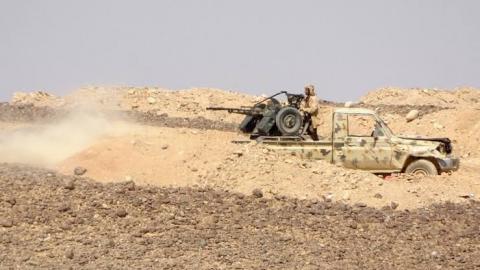Battles Grow Fiercer in Yemen’s Marib, 1 Million Refugees at Risk


The Iran-backed Houthi militias in Yemen continue to ignore UN and international community calls to halt their offensive against the governorate of Marib, where over a million refugees have sought asylum from ongoing violence in the war-torn country.
Instead of ceasing the attack campaign against Marib, the Houthis have stepped up recruitment, deployment and assaults against the oil-rich governorate.
Despite the UN Security Council releasing a statement calling for immediate military de-escalation in the northern governorate, the terrorist militants increased the number of fighters deployed to Marib’s western and northwestern fronts, field sources told Asharq Al-Awsat.
More so, Yemen's internationally recognized government reported that the management unit operating internally displaced people (IDP) camps in Marib have recorded more than 24,000 people fleeing.
“The recent wave of escalating fighting in Marib displaced over 24,000 people during the period from Feb. 6 to April 16 this year,” it said in a statement, adding that newly displaced people are facing harsh living conditions, including lack of shelter, food, potable water and medical supplies.
The UN refugee agency, for its part, warned that tens of thousands of Yemenis are being forced to flee Marib.
“The fighting is increasingly impacting areas in and around Marib city, where large numbers of people already displaced by the ongoing conflict are sheltering,” said UNHCR spokesperson Aikaterini Kitidi.
“In the first quarter of the year, at least 70 incidents of armed violence – shelling, crossfire and airstrikes – resulted in injuries or deaths of civilians in Marib, according to UNHCR’s protection partners,” she added.
According to Kitidi, in March alone, there were 40 civilian casualties, including 13 in makeshift settlements for displaced families.
“This is the highest number in a month since 2018 in Marib,” she warned.
Since the escalation of fighting, more than 13,600 residents in the region have been forced to flee their homes. Kitidi said the new displacement is putting a heavy strain on public services.
As a consequence, she revealed families are forced to share their shelters with up to three others.
“One in four families have no access to toilets, showers, or hand washing facilities near their shelters. With a second wave of COVID-19 hitting Yemen, and only half of the country’s health facilities functioning, the lack of sanitary services is making the situation more dire,” Kitidi warned.

Paris — The French humanitarian organization Acted announced that it has delivered cash assistance to nearly 89,000 people affected by displa…

Sana’a — Fuel and food imports into ports under the control of Yemen’s Houthi movement on the Red Sea have continued to fall for…

ADEN — Yemen Airways, the country’s national carrier, announced it will resume flights between Aden and Abu Dhabi beginning in January…